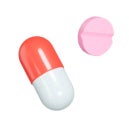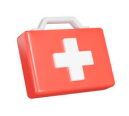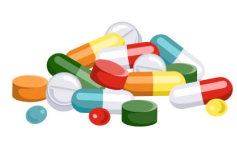Uses
What is Anti-Tumor Necrosis Factor (Anti-TNF) for?
Anti-Tumor Necrosis Factor alpha (anti-TNFα) belongs to a class of medications called biologics or more specifically, biological disease modifying anti-rheumatic drugs (bDMARD).
Biologics work by blocking targeted parts of the immune system that cause inflammation in the body.
How should I take or use Anti-Tumor Necrosis Factor (Anti-TNF)?
- It may be given aso subcutaneous injection (inject under the skin, into areas like the abdomen or thigh) such as adalimumab and golimumab. This can be injected by yourself or a caregiver at home.o intravenous infusion (inject into the blood vessel) such as infliximab. This has to be done in the hospital for typically 2 to 4 hours.
- Do not stop using your medication without checking with your healthcare professional.
- Other medications such as corticosteroids (e.g. prednisolone) or disease modifying anti-rheumatic drugs (DMARDs) may be taken with anti-TNFα.
What should I do if I forget to take or use Anti-Tumor Necrosis Factor (Anti-TNF)?
Different biologics have different intervals between doses. If you forget to inject a dose, do it as soon as you remember. Then inject your next dose at the usual time. Do not administer two doses to make up for the missed dose. DO check with your healthcare professional if unsure.
Precaution
What precautions should I take when taking or using Anti-Tumor Necrosis Factor (Anti-TNF)?
- You are allergic to this medication or any of the other ingredients of this medication.
- You plan to start a family or to breastfeed. Certain biologics may be safer than others in pregnancy.
- You are taking any other medications, including over-the-counter medicines, supplements, traditional medications and herbal remedies.
- You have any heart problems. Your doctor may want to monitor your heart condition more closely after starting anti-TNFα.
What food or medication should I avoid when I take or use Anti-Tumor Necrosis Factor (Anti-TNF)?
- Avoid eating raw, undercooked or half-cooked food.
- Live vaccines such as MMR (measles, mumps and rubella), OPV (oral polio vaccine), yellow fever or BCG (tuberculosis). Discuss with your doctor before receiving any vaccines. Also, direct contact with persons who have taken oral polio vaccine or those with infections should be avoided. However, Pneumococcal, influenza (flu) and Hepatitis B vaccinations are safe and may be given if required.
Side Effects
What are some common side effects of Anti-Tumor Necrosis Factor (Anti-TNF)?
Common side effects include: It is important to monitor the effects of your new treatment, particularly during the first few months of treatment. If the symptoms persist or are severe, consult your doctor. You may need to have regular blood tests to monitor your blood counts while on this medication. What are some rare but serious side-effects that I need to seek medical advice immediately? The symptoms of a drug allergy include one or more of the following: Some rare but serious side effects include: Severe infections such as pneumonia, fungal infection, reactivation of tuberculosis and hepatitis B If you experience any of these symptoms, you should stop your medication and see your healthcare professional immediately. Long term use of anti-TNFα may increase the risk of lymphoma and other cancers. However, this is very rare. You may also be at higher risk if you are also taking certain medications that suppress the immune system. Your doctor will monitor/manage this risk closely.
Handling
How should I store Anti-Tumor Necrosis Factor (Anti-TNF)?
Store in the refrigerator between 2-8 oC and protected from light. Do not freeze. Keep this medication away from children
How do I throw away Anti-Tumor Necrosis Factor (Anti-TNF) safely?
Pack this medication into a black trash bag and seal it tightly before throwing into the rubbish chute or bin. Dispose needles in a sharps box or tightly closed container to avoid needle prick injury.
Disclaimers
If you take more than the recommended dose, please seek medical advice immediately. The information provided on this page does not replace information from your healthcare professional. Please consult your healthcare professional for more information.
This article is jointly developed by members of the National Medication Information workgroup. The workgroup consists of cluster partners (National Healthcare Group, National University Health System, and SingHealth), community pharmacies (Guardian, Unity, and Watsons), and the Pharmaceutical Society of Singapore. The content does not reflect drug availability and supply information in pharmacies and healthcare institutions. You are advised to check with the respective institutions for such information.
Last Updated on October 2023

Need More Medicine?
Use Medicine Order Service on HealthBuddy.

Medicines Reminder
Get reminders and chart progress on HealthBuddy.

